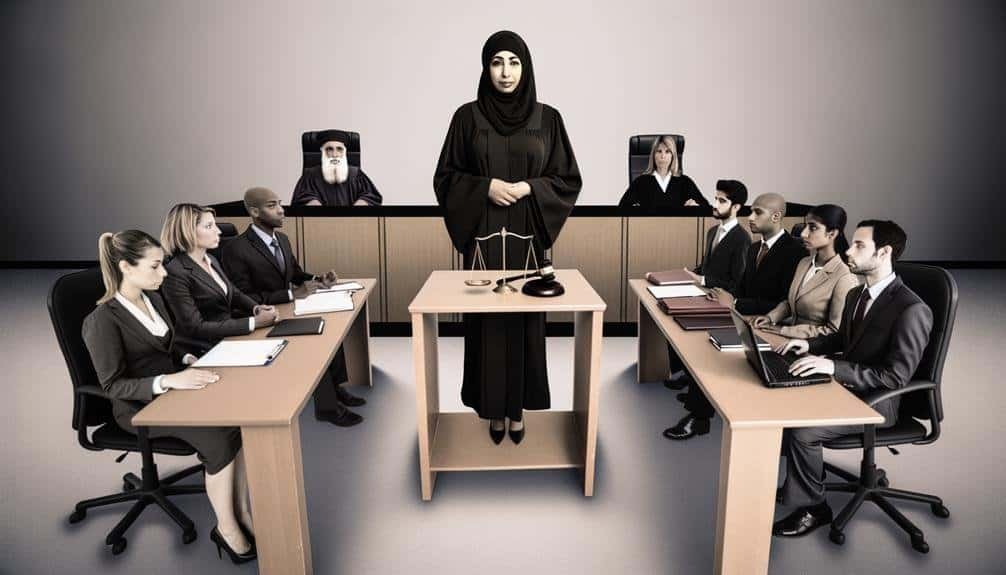What Is a Compliance Hearing in Court?
You may think that once a court case is over, there's no need for any more hearings.
However, there is a type of hearing called a compliance hearing that serves a specific purpose in the legal system.
So, what exactly is a compliance hearing in court?
Well, it's a crucial step that ensures all parties involved are abiding by the court's orders and requirements.
But it goes beyond just checking for compliance; it can have significant implications for the outcome of the case.
In this discussion, we will explore the definition, purpose, key participants, process, and outcomes of a compliance hearing, shedding light on its importance in the judicial process.
Key Takeaways
- A compliance hearing is a legal proceeding held in court to ensure adherence to court orders, judgments, or settlement agreements.
- The purpose of a compliance hearing is to assess if obligations in court orders are met, address concerns or disputes in interpretation or implementation, enforce compliance through penalties or sanctions, and maintain the integrity and effectiveness of the legal system.
- The key participants in a compliance hearing include the judge, court officials, legal representation for the parties involved, and court officials who document proceedings.
- The outcomes and consequences of a compliance hearing can vary, including finding compliance, ordering enforcement, granting extensions, finding non-compliance, and imposing sanctions or contempt of court.
Definition of a Compliance Hearing
What is the definition of a compliance hearing?
A compliance hearing is a legal proceeding held in court to monitor and ensure that individuals or organizations are adhering to the terms and conditions of a court order, judgment, or settlement agreement.
It serves as a mechanism to enforce compliance and ensure that parties are fulfilling their obligations as required by the court.
Compliance hearings are often scheduled after a court has issued a ruling or order and are used to assess whether the parties involved are meeting their obligations.
They provide an opportunity for the court to review progress, address any issues or concerns, and determine appropriate actions if compliance isn't being met.
Compliance hearings play a crucial role in upholding the integrity of the legal system and ensuring that court orders are followed, emphasizing the importance of accountability and fulfillment of legal obligations.
Purpose of a Compliance Hearing
The purpose of a compliance hearing is to assess whether individuals or organizations are meeting their obligations as outlined in a court order, judgment, or settlement agreement. Compliance hearings are of significant importance in the legal system as they ensure that parties involved in a legal dispute are abiding by the terms set forth by the court.
Here are four key reasons why compliance hearings are conducted:
- To monitor and evaluate the progress of compliance with the court order, judgment, or settlement agreement.
- To address any concerns or disputes regarding the interpretation or implementation of the court order, judgment, or settlement agreement.
- To enforce compliance by imposing penalties or sanctions on the non-compliant party.
- To provide an opportunity for the non-compliant party to explain any difficulties or obstacles they may be facing in meeting their obligations.
Compliance hearings play a crucial role in maintaining the integrity and effectiveness of the legal system by ensuring that court orders, judgments, and settlement agreements are adhered to.
Key Participants in a Compliance Hearing
During a compliance hearing, several key participants are involved in assessing whether individuals or organizations are meeting their obligations as outlined in a court order, judgment, or settlement agreement. These participants play crucial roles in ensuring that the terms of the court's decision are being followed. The table below illustrates the key participants in a compliance hearing:
| Participant | Role |
|---|---|
| Judge | Presides over the hearing and makes final decisions |
| Court Officials | Assist the judge by managing administrative tasks |
| Legal Representation | Represents the parties involved and presents their arguments |
Court officials, such as clerks and court reporters, support the judge in maintaining order in the courtroom and documenting the proceedings. Legal representation, including attorneys and advocates, advocate for their clients' interests and present evidence to support their compliance claims. Their expertise ensures that the compliance hearing is fair and impartial. Together, these participants contribute to the effective and efficient resolution of compliance issues.
Process and Procedures of a Compliance Hearing
To ensure a smooth and efficient process, a compliance hearing follows specific procedures that involve key participants in assessing the fulfillment of court-ordered obligations. These procedures are designed to address common issues and ensure that the legal requirements are met. Here are the process and procedures of a compliance hearing:
- Opening Statements: The hearing begins with opening statements from the parties involved, where they outline their positions and arguments.
- Presentation of Evidence: Both sides present their evidence, including documents, testimonies, and expert opinions, to support their claims.
- Examination and Cross-Examination: The parties have the opportunity to question and challenge the evidence presented by the opposing side.
- Closing Arguments: Each party summarizes their case and presents their final arguments, emphasizing why the court should rule in their favor.
Outcomes and Consequences of a Compliance Hearing
What are the potential outcomes and consequences of a compliance hearing? A compliance hearing is a legal proceeding where a judge assesses whether a party has complied with court orders or specific legal requirements. The outcomes and consequences of a compliance hearing can vary depending on the specific circumstances of the case. Here is a table that outlines some possible outcomes and consequences of a compliance hearing:
| Potential Outcomes | Potential Consequences | Likelihood of Occurrence |
|---|---|---|
| Court finds compliance | No further action required | High |
| Court orders enforcement | Fines or penalties imposed | Moderate |
| Court grants extensions | Additional time to comply | Low |
| Court finds non-compliance | Sanctions or contempt of court | High |
These outcomes and consequences serve to ensure that parties involved in the legal process adhere to court orders and fulfill their obligations. It is important to consult with a legal professional for guidance on the specific outcomes and consequences that may apply in your particular case.
Conclusion
In conclusion, a compliance hearing in court is a legal proceeding where the court assesses whether an individual has complied with certain court-ordered requirements or conditions. It serves to ensure that individuals adhere to the terms set by the court and may involve various participants such as the judge, attorneys, and the person being monitored.
Remember, 'compliance is the key to a successful legal journey.' 'Failure to comply can result in consequences such as fines, probation, or even imprisonment.'







